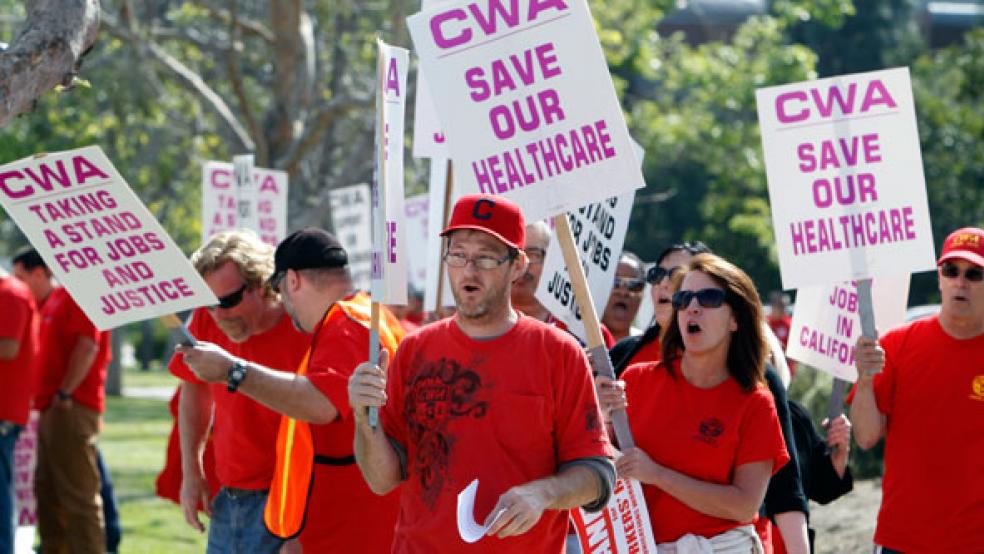Now look who’s making a fuss about Obamacare.

President Obama has had his hands full fending off Republican assaults against Obamacare. Sen. Ted Cruz of Texas and a handful of other GOP lawmakers even favor shutting down the government, if necessary, to prevent the new law from fully taking effect.
But Obama is getting blasted these days from an unexpected quarter: Major labor groups instrumental in helping the president win a critical second term are charging that Obamacare is undercutting existing union-sponsored health insurance programs and even encouraging employers to cut workers’ hours. This is the latest bizarre wrinkle in the unfolding political drama over Obama’s signature program for extending health insurance coverage to millions of uninsured Americans.
Last month, leaders of three of the largest labor unions sent a scathing letter to Senate Majority Leader Harry Reid (D-NV) and House Minority Leader Nancy Pelosi (D-CA), warning that if the problems with the insurance program are not addressed, the new health care law will “shatter not only our hard-earned health benefits, but destroy the foundation of the 40-hour work week that is the backbone of the American middle class.”
The letter was written by James Hoffa, president of the International Brotherhood of Teamsters, Joseph Hansen, president of the United Food and Commercial Workers International Union, and Donald Taylor, president of UNITE-HERE, a union that represents hotel, airport and food service workers. It stressed the unions’ displeasure with a law they all had previously supported and helped to pass.
“When you and the president sought our support for the Affordable Care Act, you pledged that if we liked the health plans we have now, we could keep them. Sadly, that promise is under threat,” said the letter. “We have been strong supporters of you. In campaign after campaign we have put boots on the ground, gone door-to-door to get out the vote, run phone banks and raised money to secure this vision. Now this vision has come back to haunt us.”
AFL-CIO president Richard Trumka echoed those concerns on Thursday, telling reporters during a breakfast event that the administration and Congress made some serious blunders in drafting the legislation that must be fixed to quiet the growing union discontent.
RELATED: HERE’S WHY TRUMKA, A KEY ALLY OF OBAMA, BACKS YELLEN FOR FED
“We’ve been working with the administration to find solutions to what I think are inadvertent holes in the act,” said Trumka. “When the act was put together, it wasn’t thought completely through. So we work on a daily basis. I’m hopeful we get something done in the very near future.”
PERVERSE INCENTIVE?
From labor’s perspective, arguably the biggest problem is that the law – when fully implemented – will create an incentive for employers to keep their workers’ hours below 30 hours a week.
The Affordable Care Act will eventually penalize firms employing 50 or more people that don’t offer health insurance – or that offer coverage below minimum standards. This is the so-called “employer mandate.” The White House this summer put that provision on hold until 2015 to give medium and large employers the opportunity to better prepare and plan for the changes and reporting requirements. But once that provision finally takes hold, union leaders say that companies will cut the hours of workers below 30 hours per week to get under the 50-worker threshold for providing health care coverage.
With salaries remaining relatively static during this tepid economic recovery, a cutback in hours would be tantamount to a substantial pay cut for many union and other workers who are struggling to make ends meet.
RELATED: 4 SIGNS HEALTH CARE COSTS ARE STILL OUT OF CONTROL
“Employers are trying to plan their future by creating a work force that gets 29-and-a-half hours or less a week, so that they don’t have to pay health care,” Trumka said yesterday. “That is obviously something that no one intended….Is that an issue? Yeah, that’s an issue.”
Labor leaders also fear that Obamacare may end up “destroying” the union’s multi-employer health plans unless it is changed.
At issue are “Taft-Hartley plans” – the non-profit health care plans long used by unionized workers in the building trades and service industries and jointly administered by participating companies and unions.
Those plans have traditionally allowed workers in transient industries to move between employers while still preserving the same quality of health care. Because union leaders have helped negotiate those plans, they typically offer strong coverage at a low out-of-pocket cost to workers.
Under the Affordable Care Act as currently interpreted by the administration, union members with this form of health insurance coverage would not be entitled to federal tax subsidies available to others who purchase policies from private companies in the new insurance exchange, according to labor leaders.
Moreover, many union members who hold these “non-profit” policies may get hit with federal taxes to help offset the cost of the subsidies offered in the new state exchanges.
“Taken together, these restrictions will make non-profit plans like ours unsustainable, and will undermine the health-care market of viable alternatives to the big health insurance companies,” according to the letter sent to Reid and Pelosi by the labor chiefs.
The Treasury Department has signaled it views the Taft-Hartley plans as equivalent to other employer-based plans, which aren’t eligible for subsidies. And the Congressional Research Service, a nonprofit legislative analysis group, published a paper saying Taft-Hartley plans likely wouldn’t be eligible for subsidies based on the way the law is written.
The health care law is likely to be a prime topic of conversation when Obama addresses the AFL-CIO’s Quadrennial Convention next month in Los Angeles. Obama’s relations with labor have been rocky at times, for sure. Yet while he’ll talk about his plans to create jobs, provide better pay and strengthen workplace protections, the president’s speech on Sept. 9 may not include every reassuring word that labor leaders are right now longing to hear.





